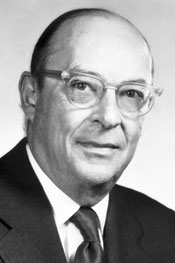
The son of the first dean of the University of Wisconsin Medical School, Bardeen graduated from high school when he was 15 years old. He went on to attend the University of Wisconsin, earning a degree in electrical engineering in 1928 and a Master of Science degree in 1929. Bardeen then spent a few years working as a geophysicist for Gulf Research Laboratories and then left to go to Princeton where he earned a Ph.D. in mathematical physics in 1936. Bardeen then accepted a teaching position at the University of Minnesota, Minneapolis. He remained there until 1941, when he left to work as principal physicist at the US Naval Ordnance Lab in Washington, DC. During World War II, he led a group that designed magnetic mines and torpedoes. While in DC, Bardeen turned down an invitation to join the distinguished scientists of the Manhattan Project, who were developing the atom bomb.
When World War II ended, Bardeen accepted a research position at Bell Laboratories. There, along with Walter Brattain and William Shockley, he invented the transistor in 1947. Fifty times smaller than the vacuum tubes it replaced in televisions and radios, the transistor made possible the development of almost every modern electronic device, from telephones to missiles. The transistor made miniaturization possible and opened the door for the production of pocket-sized radios and computer parts. The three scientists were awarded the Nobel Prize for their work in 1956.
Bardeen left Bell to teach at the University of Illinois, Urbana-Champaign in 1951. While there, he set up two research programs. In the Electrical Engineering Department, he focused on semiconductors and in the Physics Department he explored superconductivity. There, along with Leon Cooper and John Schrieffer, Bardeen developed a theory of superconductivity, which in 1972, earned him a second Nobel Prize in Physics. In addition to his two Nobels, Bardeen earned several other awards during his life including the National Medal of Science, the Franklin Medal, and the Presidential Medal of Freedom. Bardeen died of heart disease on January 30, 1991.
Source Credit: Thomas Lundquist





